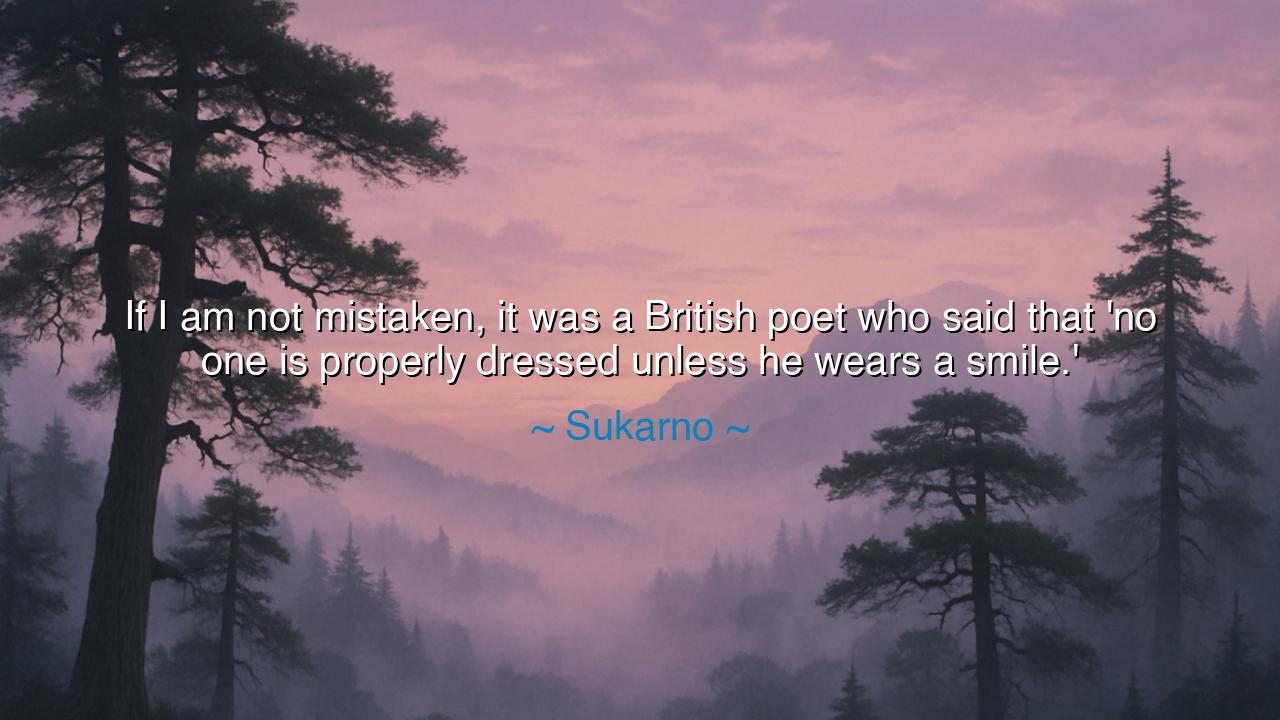
If I am not mistaken, it was a British poet who said that 'no one
If I am not mistaken, it was a British poet who said that 'no one is properly dressed unless he wears a smile.'






Hear the words of Sukarno, the fiery first President of Indonesia, who once proclaimed with wit and wisdom: “If I am not mistaken, it was a British poet who said that ‘no one is properly dressed unless he wears a smile.’” At first, these words sound light, almost playful, but in truth they reveal a teaching of great depth. For a man may clothe himself in gold, silk, or the robes of office, but if his face bears no smile, he remains unfinished, lacking the most essential adornment of all—the expression of warmth, sincerity, and humanity.
The origin of this wisdom lies in the simple truth that clothing and wealth are outward symbols, but the smile is the universal garment of the heart. A poet may have spoken it, but Sukarno carried it into the realm of leadership, reminding his people that no matter the titles they wore or the uniforms they displayed, their true dignity would always be found in kindness. A smile, unlike jewels or crowns, is accessible to all—rich and poor alike. It is the attire of equality, the adornment of the soul.
History has given us examples of this power. Consider Mahatma Gandhi, who wore the humblest of garments, spun from his own wheel, yet whose gentle smile clothed him with authority greater than kings. His simplicity did not diminish him—it magnified him, for his smile told the world that his power was not rooted in violence or wealth, but in peace and inner strength. His appearance may have been poor in fabric, but he was always richly dressed in spirit.
Or think of Abraham Lincoln, whose rugged and weary face carried the lines of sorrow. By outward measure, he was not elegant nor finely dressed compared to the lords of Europe. Yet those who met him spoke of the sudden warmth of his smile, which transformed his stern visage into something unforgettable. That smile gave strength to a nation torn by war, reminding people that their leader, though burdened, still carried within him compassion and hope. Truly, no garment could have suited him better.
The meaning of Sukarno’s reminder is thus this: that the smile is not superficial decoration, but the crowning piece of one’s attire. It communicates more than words, softens more than speeches, and builds bridges faster than treaties. Without it, dignity appears cold, and elegance becomes empty. With it, even the poorest among us shines with nobility, and the most powerful among us becomes approachable, human, and beloved.
The lesson is clear: when you rise each morning, do not think first of what clothes to wear, but of what spirit to carry. Ask yourself not only whether your body is covered, but whether your face is lit with kindness. For the world does not remember the cut of your suit or the shimmer of your dress—it remembers the way your smile made them feel seen, valued, and at peace.
Practical action must follow. Practice the art of smiling not as an empty gesture, but as an honest gift. Offer it to strangers who pass you, to friends who greet you, to loved ones who share your table. Even in hardship, let your smile remind others that joy can still be found. Do not underestimate this power—for a single smile has lifted armies, healed wounds, and inspired nations.
Thus the teaching is sealed: to be truly dressed is to clothe yourself in humanity, and the finest garment is the smile. Sukarno, echoing the poet, reminds us that wealth fades, fashions change, but the smile endures across time, across cultures, across hearts. Wear it always, for in doing so, you are never naked, never poor, never forgotten—you are complete.






AAdministratorAdministrator
Welcome, honored guests. Please leave a comment, we will respond soon